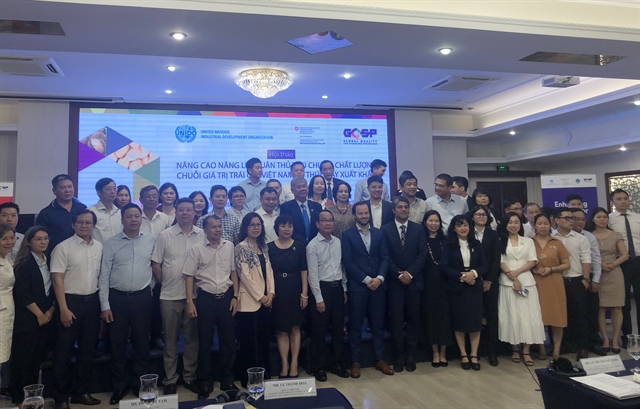 Economy
Economy


|
| Participants at the workshop “Increasing standard and quality compliance capacity of Việt Nam’s tropical fruit value chains to promote exports” in HCM City on September 11 — VNS Photo |
HCM CITY — With increasing technical barriers to trade and intense competition, Việt Nam’s fruit farmers and businesses need to meet quality requirements and improve their competitiveness to grow exports, a workshop heard in HCM City on Monday.
According to Lê Văn Thiệt, deputy director of the Plant Protection Department, fruits are among the country’s key exports, with their value growing at 10-15 per cent a year for the last five years.
Producers and exporters have invested in improving production, processing, packing, and transportation to ensure they meet importers’ quality and food safety requirements.
"The number of orchards and packing houses receiving Production Unit Codes and Pack House Codes approved by importing countries is rising rapidly," he said.
"In addition, numerous technical assistance activities aimed at enhancing compliance capacity for businesses and growers have been implemented, particularly in the ready-to-export ecosystem.”
However, the sector had encountered challenges such as importing countries increasing technical barriers to importing products, fiercer competition in international trade, and the impacts of climate change.
"Furthermore, storage, logistics, and phytosanitary treatment infrastructure have not kept pace with the rate of development.”
Bahramalian Nima, project manager of the Standard and Quality Programme at the United Nations Industrial Development Organization (UNIDO), said: “International trade of food and non-food products are governed by increasingly prevalent and continuously evolving technical regulations and standards.
"Many countries face challenges in complying with the safety and quality requirements established by these regulations and standards.”
He said the aggregate rejection rate of Vietnamese fruits and vegetables by Australia, China, the EU, Japan, and the US increased significantly from 2012 to 2020, possibly due to a substantial increase in export volume to these markets.
Pesticide residues, labelling and bacterial contaminations were among the major reasons for these rejections.
However, this was not the sole reason why Vietnamese foods and vegetables struggle to compete in the market, he said.
Price and the ability to access those markets were also challenges that must be addressed alongside compliance-related issues, he said.
Furthermore, with rising sea levels, the Mekong Delta was experiencing increasing salinity in the soil, and this means that many orchards and fruit and vegetable productions might not be viable in the coming decades, he said.
"So, if we consider both immediate competitiveness and long-term sustainability, we must address the pesticide issue and also prepare for the impact of climate change in the Mekong Delta.”
Addressing these challenges would require interventions at both the government and private sector levels.
The private sector needed to gain a better understanding of the standard requirements of the markets and be equipped to apply technologies and management practices that will help them comply with these standards.
The government needed to provide assurance to the markets that Vietnamese products could meet the requirements. This could be achieved through interventions related to strengthening the quality assurance system, the surveillance system, inspection services, and implementing residue monitoring plans for agricultural products, he explained.
Etienne Jenni, programme manager for trade promotion at the Swiss State Secretariat for Economic Affairs, said: "Vietnamese exporters, especially small and medium enterprises, encounter difficulties in meeting and proving compliance with market access standards, technical regulations, and market requirements.
"The country's standardisation infrastructure, including accreditation bodies, testing organisations, and conformity assessment bodies, is inadequate to meet the needs of exporters and international accreditation requirements. The disconnection between national standards bodies and trade promotion organisations makes it difficult for exporters to demonstrate compliance with market requirements and improve national competitiveness.
"We believe that addressing these challenges is crucial to complement Việt Nam's trade liberalisation efforts. Overcoming technical barriers will enable companies to access more target markets and take full advantage of tariff reductions from existing and future free trade agreements.
"In addition, as technical barriers to trade continue to rise with the introduction of new regulations and market requirements, we believe it is prudent to proactively develop and adapt quality and standardisation infrastructure systems to changing circumstances."
He also mentioned that Switzerland, in collaboration with UNIDO, has provided technical assistance through the Global Quality Standards Programme (GQSP) to Việt Nam, focusing on addressing these challenges within the mango and pomelo value chains in the Mekong Delta.
Organised by UNIDO, the Agro-Forestry-Fishery Quality, Processing, and Market Development Authority and the Institute of Agricultural Engineering and Post-Harvest Technology, the workshop was held under the framework of the GQSP to share the programme’s results in the 2020-23 and discuss activities to be done in the next phase to promote the development of the fruit sector. — VNS




